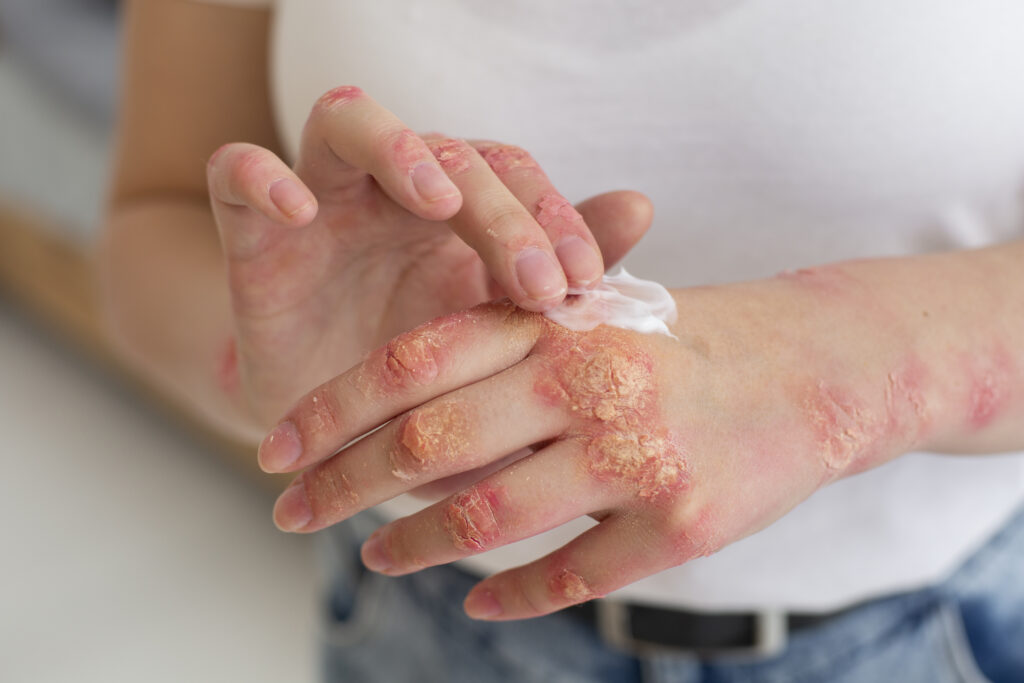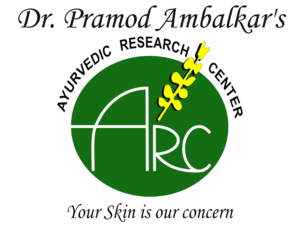- drambalkar@yahoo.co.in
- Mon - Sunday 10:00 AM - 02:00 PM
How To Prevent Psoriasis From Spreading?
Psoriasis is not transmissible from person to person; it cannot spread from one individual to another. However, it can extend from one part of the body to another, particularly when left untreated. To prevent the worsening of symptoms, it’s crucial to steer clear of triggers like alcohol and tobacco and adhere to a prescribed treatment regimen.
Psoriasis is a prevalent autoimmune disorder that impacts the skin. It can cause discomfort, and individuals living with this condition may encounter social stigma or notice changes in how others interact with them when they have a flare-up. Nevertheless, it’s essential to emphasize that there is no reason to feel ashamed of having psoriasis.

Explore the following article to gain insights into the potential for psoriasis to spread throughout the body and discover strategies for slowing down or preventing its advancement.
Does psoriasis spread?
Psoriasis primarily impacts the skin, and individuals unfamiliar with the condition might mistakenly believe it’s contagious. However, it’s important to clarify that psoriasis is non-contagious, meaning one person cannot transmit it to another.
The spread of psoriasis typically occurs within an individual’s own body, rather than being transferred from one person to another. This internal spreading is not due to the condition being passed from affected skin to other areas but rather results from alterations in the immune system’s processes, which underlie the development and progression of psoriasis.
Psoriasis can manifest in various ways depending on the type a person has. Plaque psoriasis, the most common form, typically leads to the development of red, scaly patches on the skin. These patches are commonly found on the outer elbows, knees, and the scalp, although they can appear anywhere on the body.
In contrast, erythrodermic psoriasis is a severe and rare form of the condition that can spread extensively across the body, resulting in discolored or intensely red patches. It is crucial to note that erythrodermic psoriasis can be life-threatening, so individuals who experience rapid spreading and severe redness or discoloration should seek immediate medical attention.
Furthermore, some individuals with one type of psoriasis may develop another type, such as inverse psoriasis. Inverse psoriasis often emerges in skin folds, such as those found in the armpits.
Therefore, understanding the type of psoriasis one has and being aware of its potential spread or development in different areas of the body is essential for effective management and timely medical intervention if needed.
Risk factors for psoriasis that spreads
Without treatment, psoriasis is more prone to spreading and worsening. Long-term management options for psoriasis include biologic drugs, which work by disrupting the excessive immune system response responsible for psoriasis.
Biologic drugs are designed to decrease the frequency of flare-ups, alleviate symptom severity, and slow down the progression of the condition.
Other factors that may triggerTrusted Source a flare or worsen symptoms include:
- smoking
- alcohol
- an injury to the skin
- infections and other illness
- stress
- cold weather
Frequently Asked Questions
To determine if your psoriasis is spreading, closely observe your skin for signs such as new lesions, enlargement of existing plaques, increased redness and inflammation, or itching and discomfort in previously unaffected areas. Additionally, watch out for joint pain, as psoriatic arthritis is a common complication. If your symptoms worsen overall, including more frequent and severe flare-ups, it may indicate spreading or worsening of the condition. Regular check-ups with a healthcare provider are crucial for monitoring and addressing any developments in your psoriasis. Early intervention and proper treatment adjustments can effectively manage the condition and prevent further spreading.
Psoriasis is not contagious and cannot be transmitted to your children through physical contact. It is primarily a genetic condition with a complex inheritance pattern. If you have psoriasis, there is an increased likelihood that your children may inherit a genetic predisposition to the condition. However, it's important to note that not all children of parents with psoriasis will develop the condition, as other factors, such as environmental triggers, also contribute to its development. While psoriasis itself is not contagious, it's essential to be aware of the genetic predisposition in your family and monitor your children for any early signs or symptoms, seeking medical guidance if needed to manage and treat psoriasis effectively.
Scratching psoriasis lesions can exacerbate the condition and make it appear as though it's spreading, but it doesn't actually cause the psoriasis to spread to other areas of your body or to other people. What scratching does is irritate the skin, increase inflammation, and potentially lead to the formation of new lesions near the scratched area, making it seem like the condition is spreading. It's essential to resist the urge to scratch psoriasis as it can worsen symptoms, increase the risk of infection, and potentially lead to the Koebner phenomenon, where new lesions develop at sites of skin injury or trauma. Instead, opt for gentle care, moisturizing, and follow your prescribed treatment plan to manage psoriasis effectively and minimize the itchiness that may lead to scratching.

Get in Touch with us Today to Begin Your Journey of Transformation

Contact Us
- Dr.Ambalkars Aayurvedic Research Centre, ARC Bhavan, Vijay Vihar Complex, Evershine City, Last Stop, Vasai (E)
- drambalkar@yahoo.co.in
- +91 9320193201
- +91 9766362776

Frequently Asked Questions
Psoriasis is a chronic Inflammatory skin disease. Normally skin cells take 28 to 30 days to mature but inpsorlasis it happens within 8 to 10 days. These extra formed skin cells appear as scales on scalp and body which Is called as “psoriasis”.
Generally 80 to 90% cases start from scalp as “dandruff”. After some months or sometimes after some years this dandruff converts in thick scales which we call as scalp psoriasis. If left untreated this may appear on whole body in the form of red inflamed patches covered by thick silvery scales. Burning, itching, bleeding in lesions some time burning eyes and aching joints are also associated symptoms.
1) Scalp Psorasis 2) Guttate Psorasis 3) Plaque Psorasis 4).Inverse Psorasis 5) Nail Psorasis 6) Palmoplantar Psorasis 7) Pustular Psorasis 8) Psoriatic Artistis
There is a slight difference during treatment & also difference in period to get results for these different types of Psoriasis.
Exact cause is still unknown. Initially psoriasis was categorized in autoimmune disorder. But Antigen Antibodies are absent, which is not supporting to this. Nowadays some Chromosomal abnormalities are observed in psoriasis patients but still treatment is not available to correct this defect. But in Ayurveda (an Ancient Indian health Science) psoriasis was called as “Ek Kustha” or “Kitibh Kushtha.” Signs, symptoms & treatment are also mentioned in this historic science.
No.Psoriasis is not related with any other desease. But during treatment of psoriasis some modifications are required in special cases.
For ex - salt cannot be restricted in thyroid cases.
For ex - Beta blockers are stopped in B.P patients etc.
Yes. All patients can live a psoriasis free life after treatment. There is no residual damage left to skin other than some scars.
ARC not only involved in treatment of psoriasis Patients, but also ahead in creating awareness about this disease In society. ARC always guide the people about this disease, its signs, symptoms, treatment, side effects, complications etc. By using “Ayurveda” as a principle method along with some changes in diet and lifestyle, ARCs Succeeded to treat maximum no. of patients, Since last 25 years this Process is continuously going on. Maximum no of patients are referred to ARC hospital by old benefitted patients of this treatment. This is the only reason which makes it far superior than others.
After starting the treatment and diet modification within 2 to 3 months, some positive changes start appearing. Treatment will be continued till normalization of total skin, This span may be 6 to 9 months in some cases or may be 2 yrs in Some cases. Treatment Duration depends upon regularity of medicines and diet, physical, mental status of the patients and presence of other major illnesses if any.
Diet and lifestyle modification are equally important as the medicines in Ayurveda for perfect balance of Kafa, Vata and Pitta, diet modifications are very important. This will help us to get faster result. After recovery also during winter season these modification are to be followed to prevent the relapse.
This is not very common, If patients is being treated with oral or local steroid applications, due to sudden break in continuity this can happen. If previous prescriptions are shown our doctor can stop them step by step to slove this kind of Problem.
If more than 25% body area is affected by skin disease, there are more chances to get infection. Bacteria and viruses from atmosphere can easily enter the body through this damaged skin which later on show symptoms of infection like itching, burning, bleeding, pus formation, fever, swelling etc.
In some severe cases anaemia, hypoprotennia, electrolyte imbalance, septicemia like
complications are also seen. For all these type of patients hospitalization in our hospital is necessary to treat complications. 10 to 15 days are required for this treatment in our hospital.
